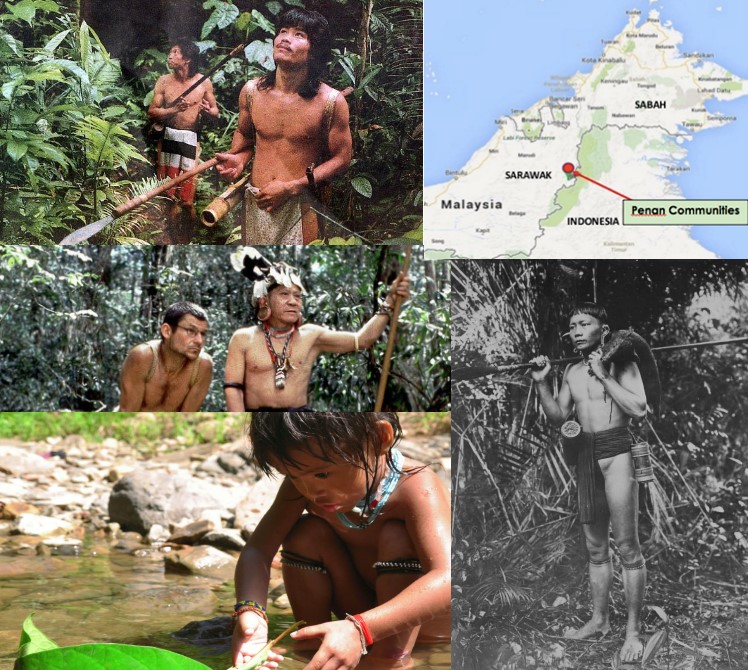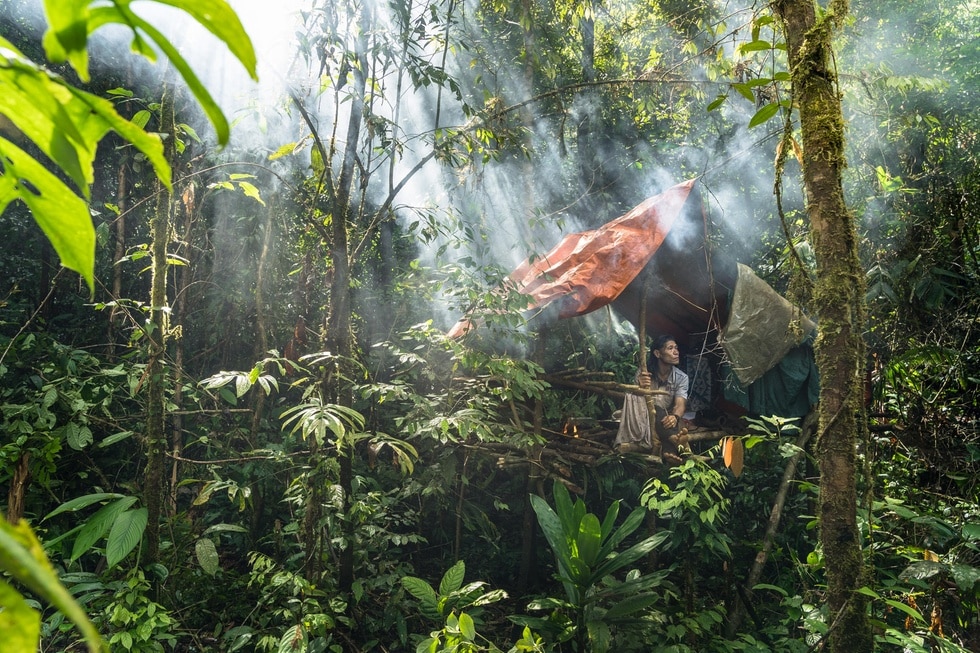What happened to you personally and/or to the team in between?
For me personally, it was a fascinating topic. The things I learned definitely opened my eyes. I am certain that just a few other topics would have been able to do it in such a manner. The people I have met during the process of creating were one of a kind. For example my friend Rudolf Isenschmid, a guy who has been with the Penan on multiple occasions, or the photographer Tomas Wüthrich, who kindly allowed me to use his phenomenal pictures. Additionally, I started to appreciate what I actually have and how good we have it here in Switzerland. The problems we are facing are almost non-existent in comparison to what the Penan face on a daily basis. It is almost incomprehensible for us, having to fight for our homes, for example.
What kind of knowledge and experience could you achieve?
I realized, that I do not need much to be happy. This might sound a bit like something a lot of people would say, but to see how the Penan live really opened my eyes. Through the interview, I was able to experience second hand what it means to interact with this special tribe. When I spoke with the photographer who was with the Penan in 2019 and took amazing pictures, which helped me to immerse into the project even better.
How biased has your perception of the “real world” been?
Really bias actually, the conception of my world in comparison to the life on Borneo is vastly different. The problems we face could not be more different. We feel like we got screwed over when the train does not come on time, but they fight for the home on a daily basis. They need to protect their home against the illegal logging, an issue they did not cause themselves but have to carry the consequences. Just because we, the rest of the world want the tropical woods and their own governments need space for agriculture. It definitely helped me to realize how privileged we have it here in Switzerland.
Did your guesses correspond?
Up to a certain degree for sure, but also not really. I have heard a lot during past conversations with my interview partner. But through the interview I started to ask questions I have not asked before, through that it has changed my point of view on the indigenous tribe from Borneo and on my own life. I fulfilled my goals for my project, I created something I can be proud of, something which can help to rethink and change the view of the world. At least a little bit.
So far I have done everything needed for IDAF and publication. I have updated all of my earlier posts regarding my publication process. The only thing I still need to prepare for is the podcast tonight. I am planning on updating this feed later today for my notes for the podcast, and tomorrow I am trying to update regarding the podcast. I assume the upload of the episode happens in the next month. But I am sure I will receive a raw version of the audio earlier than that.
I have finished my article for the IDAF project, unfortunately I wont be able to publicate it. There are also pictures in it, but i wont add them again, because I have already uploded them in an earlier post.
More...
Via: Whatsapp Videochat, 11.04.2023
-Wann warst du bei den Penan in Borneo?
Ich war bei den Panan in den Jahren 2001, 2003, 2007 und 2011. Das erste Mal als wir uns auf die Suche von Bruno Manser machten.
-Wie kamst du dazu mit den Penan zu interagieren?
Interagiert habe ich vermehrt leider nur mit dem Dolmetscher. Er war ein Halb-Penan und er übersetzte von Malay, die Sprache der Penan, ins Englische. Die Penan selbst sprechen kein Englisch.
-Wie hat die Modernisierung den Lebensstil der Penan verändert?
Es leben noch einige wenige Hunderte Penan wirklich als Nomaden, diese befinden sich in den oberen Regionen. Bei diesen hat sich nicht viel verändert. Im flacheren Teil wird halt leider stark abgeholzt. Aus diesem Grund ist es nicht mehr wirklich möglich dort so zu leben. Sie kriegen von der Regierung Baracken und leben zur Hälfe in diesen und zur anderen Hälfte im Dschungel. Also einfach gesagt wurde der Grossteil der Penan indirekt dazu gezwungen ihr nomadisches Leben aufzugeben. Leider hat dies nur sehr selten Vorteile für die Penan, da viele von ihnen in Dörfern oder Städten verelenden.
More...
A quick update regarding my project. We started with the IDAF and I have created my media planning. My goal is to be able to publish my project, because of that I intend on getting in contact with as many people as possible.
Additionally, I was able to do one of my interviews. Unfortunately, I still have not received an awnser from my other interview partner, so I guess I will not hear anything anymore. I still need to do the evaluation, but I am planning on doing it this afternoon.
Hey there! My project is about the Penan from Borneo. The Penan have a very different lifestyle in comparison to our own! If you are interested in getting to know a new culture, this is the project you should follow.

Media possibilities I would like to use in my project:
Interview --> Audio, evt even a video
Online Research --> Different websites
Videos --> Movie form Bruno Manser, Youtube, etc
Unfortunately it wont be possible to visit the Penan myself. It is just to far away.
Pictures for "Penan from Boreno"
All of the pictures bellow have been taken and belong to Tomas Wüthrich. The pictures have been made on his journey to the Penan in 2019.

More...
THIS IS NOT A FINAL VERSION
Penan from Borneo
The Penan are an indigenous tribe on the island of Borneo, Malaysia/Indonesia. Today there are around 10’000 tribesman left. Most of the Penan settled down and left the nomadic lifestyle behind, but they still rely on the rainforest for most of their basic needs. Roughly a few 100 Penan still live the nomadic lifestyle and fully depend on their surrounding for their day-to-day needs. The traditional nomadic lifestyle includes hunting, fishing, and gathering of over 300 plants, roots and fruits.
More...
Unfortunately, I won't be able to visit the Penan myself. But luckily I found a collaboration partner, which was in personal contact with this indigenous tribe from Borneo and has interacted with them on multiple occasions. He was one of the people who was looking for Bruno Manser when he vanished. Additionally, with Frau Suter's help, I was able to get in contact with the sister of Bruno Manser. With the help of these two contacts, I should be able to create a good project.
I'm looking forward to do this project, although it's a difficult task to resolve.